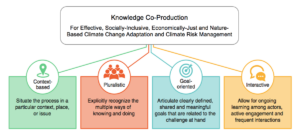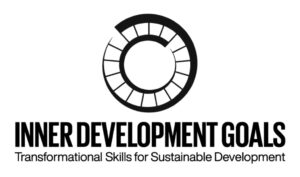What is Behind the Idea of the Climate Co-Adaptation Lab?
The research and innovation processes as part of the Climate Co-Adaptation Lab follow certain principles for knowledge co-production. Knowledge co-production (Johner et al. 2025) is an iterative and collaborative process involving diverse types of expertise, knowledge and actors to produce context-specific knowledge and pathways towards a sustainable, low-carbon and climate-resilient future.

The collaboration at The Lab is based on the following principles. We believe that:
- successful collaboration is characterized by the fact that members contribute their different strengths and different skills;
- through collaboration across disciplines, challenges can be better analyzed, understood and solved, while we acknowledge that trans- and interdisciplinary collaboration is challenging and need to be re-thought (Schipper et al. 2021, Huang & Harvey 2021, Muccione et al. 2019);
- all actors involved should aim to generate an innovation culture that promotes the exchange of ideas, thoughts, and knowledge;
- there is an inherent value of the collective wisdom of the group, for example in view of resolving potential conflicts;
- every collaborator should strive to help the group make the best use of the contributions of each of its members;
- collectively, we should build and show respect for and a better understanding of different viewpoints among the collaborators;
- collaboration leads to better informed, more creative, balanced and enduring decisions because of the shared commitment to and responsibility for the process, results, and implementation.
Collaboration is considered an act of engagement across domains and disciplines that can be as important for the pursuit of sustainability as the production of knowledge and innovation. Compared to disciplinary research processes, knowledge co-production extends from a collaborative stage of problem framing and trust-building, through knowledge generation, to a phase of exploring the practical impacts of the process. We are convinced that co-production processes produce more than just knowledge; they develop capacity, build networks, foster social capital, and implement actions that contribute to sustainability. We have further subscribed to foster the Inner Development Goals as part of our collaboration in the Lab.
 We collectively appreciate the value of pluralism of ideas and knowledge types
We collectively appreciate the value of pluralism of ideas and knowledge types
The co-production of knowledge as part of The Lab process therefore explicitly recognizes the multiple ways of knowing and doing. It has been persuasively argued that all knowledge is inevitably situated and partial, highlighting the practical and ethical importance of ensuring a range of perspectives on a given issue. Achieving pluralistic co-production entails bringing together academics (from different disciplines) and people from other sectors (from, for example, government, business, civil society, local and indigenous communities) to generate knowledge and catalyse change. It is important to ensure that those involved represent a range of skills (for example, analysis, translation, synthesis, facilitation and evaluation) and types of knowledge and expertise (for example, experiential, local, traditional, academic and official). This diversity generates an enriched understanding of the ecological, political and technical aspects of an adaptation or sustainability challenge. Moreover, research suggests that under the right conditions, knowledge outcomes are enhanced by including various other dimensions of diversity, such as gender, ethnicity, age and nationality.
We believe that the primary task of any collaborative effort is to engage in shared learning. All participants to collaboration bring knowledge, expertise and experience related to the task. And yet we have already acknowledged that what we individually bring is insufficient. The work in collaboration is to take what we know individually and share it, so all participants achieve a deeper level of shared knowing.
